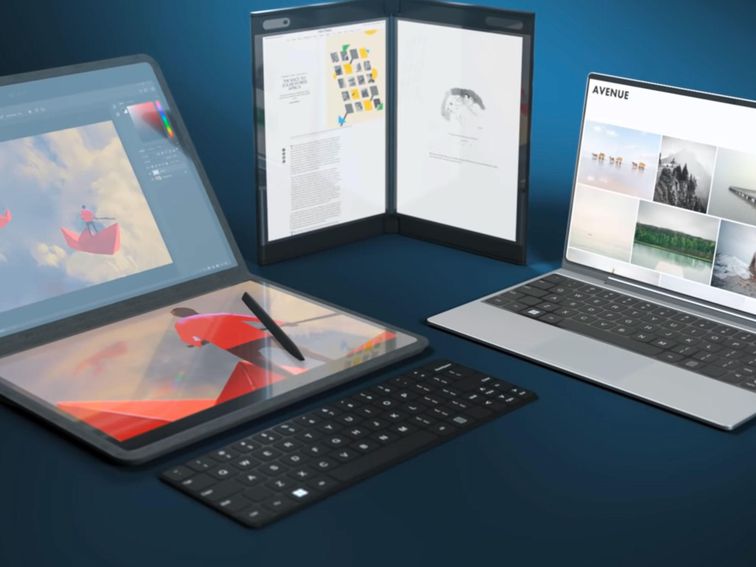Intel mockups of new devices powered by its 10th-gen processors.
Intel
I’m writing these words on an iPhone as I stand in line at a McDonalds knockoff in Taiwan. I’d rather be away from my phone, but alas time is short and this article won’t write itself.
I just got out of Intel’s Computex keynote and in a moment I’ll have to zip across town to another convention center. Subsequent lines in this column are likely to be written on a MacBook in the back of a taxi.
You may not be a journalist, but I would wager that some variant of this experience sounds familiar to you. We have phones and laptops on our person approximately 100% of the time, so opportunities for productivity are constant. And if what I’ve seen at Computex is any indication, this cram-it-in-where-you-can style of work isn’t going anywhere. Productivity will always be an option.
The culprits? Intel and Qualcomm. These two semiconductor behemoths are competing against each other to get their processors in as many devices as possible. Time is money, and these companies are thinking you’ll give them money if they give you laptops and tablets that save time. So battery life gets longer, wait times get shorter and your productivity allegedly gets a boost.
Qualcomm is one of many companies at Computex promising a “new era” of PCs. Qualcomm powers Samsung’s new 5G phone, plus similar upcoming phones from LG, OnePlus and Nokia. Samsung wants to make 5G laptops happen too. This will be done with Qualcomm’s Snapdragon 8cx chipset, which is in Lenovo’s Project Limitless, the world’s first 5G laptop.
At its keynote, Qualcomm compared the 8cx’s performance to a laptop running an Intel Core i5. In a web-browsing test, Qualcomm found that its own processor could load 10 web pages around 13 seconds quicker than Intel’s. Another test, this one focused on multi-tasking, showed that the 8cx could save 1 minute and 11 seconds over the Core i5. Using some impressive mathematical gymnastics, Qualcomm senior VP Alex Katouzian showed how an 8cx-powered device could save you almost 11 work days of productivity a year.
Then there’s Intel. Its two chief Computex announcements were Project Athena and its new 10th-generation Ice Lake chips. Ice Lake is a substantive jump over Intel’s 9th generation processors and allows for AI power, longer battery life and much thinner laptops. Meanwhile, Project Athena is a new class of laptop.
For a company to get a device branded as a Project Athena laptop, it must reach certain spec requirements: It needs to have a “real world” battery life longer than 9 hours, it needs to add 4 hours of battery life with a half hour of charging, and it needs to wake from sleep in less than a second.
Now playing:
Watch this:
Qualcomm gives us a glimpse of our future in 5G
2:27
Less than a second. Laptops and PCs are so advanced that companies like Qualcomm and Intel are competing over seconds. You do most of your work on your laptop, so there should be no barrier between you and it. Your laptop should be there at all times, ready to get you out there and be a productive member of society.
As a guy filing this story from the back of a cab, I’ll tell you that this even more productive future doesn’t excite me.
(By the way, Lenovo Senior Vice President of PC Johnson Jia came onstage at Intel’s conference to show off the Yoga S940, the first known Project Athena laptop. Lenovo gets around.)
It’s hard to be mad at Intel or Qualcomm. It’s their job to improve their products and give us what we want, and they’re doing that. Intel’s 10th-gen processors look promising, and Qualcomm-powered 5G laptops could be a game changer. But sometimes we don’t know what we’re getting ourselves into.
A render of Lenovo’s 5G laptop, currently codenamed Project Limitless.
Lenovo/Qualcomm
Let me ask you a question. Do you like email? The fact that you can be reached at any time by anyone from any place is miraculous. Sometimes it’s a lifesaver. But most of the time, 24/7 email access is a distraction that increases your stress about something that could and should wait until tomorrow. (Just ask my editor, who had to read a draft of this column at 10 at night.)
This is the story of technologies that allow us to be more productive. “Imagine how much easier this would make my life,” you think. Next thing you know you’re filling out spreadsheets on the train to work, making corrections on the train home from work and checking your email as you unsuccessfully attempt to watch Netflix.
I don’t need to tell you how unhealthy this is. We’re all onboard with the idea that social media is harming us. The issue I have with Facebook and Twitter isn’t what’s on there, even though both are reliable outrage factories. It’s their omnipresence. They’re. Always. On. Constant pings make it hard to switch them off. But at least I know that’s a problem.
We don’t have the same allergy to productivity because, I guess, there’s more dignity in cramming in work on the bus than in judging people on Instagram. But working too much has been shown to cause depression, anxiety and even strokes. How much better is it really?
Companies like Intel and Qualcomm are fighting for your minutes and your seconds, just like Facebook and Twitter. And that’s OK. Laptops have gotten thinner, lighter, faster and longer lasting, thanks in part to both companies, so good on them. But when the new era of PCs hits, when we have always-on, location-aware 5G laptops, just make sure to take a break every now and then.
I, for one, am going to treat myself to another bootleg Big Mac.
Published 10:30 a.m.
Update, 4:30 p.m.: Adds information on Lenovo Yoga S940.
